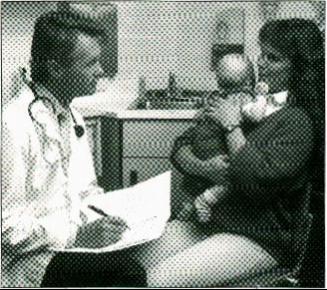|
|||||
|
The following article is an electronic reproduction from:

Health or Privacy: State's New Tracking System Stirs Debate A new tracking system developed by the Texas Department of Health (TDH) to make sure every child receives immunizations has once again raised the privacy versus public health debate. According to a March report filed by Texas Rep. John Shields, R San Antonio, health department regulations for a mandated immunization non registry violate Texas law by not requiring parental consent. Even though a law passed in 1997 requires consent, current TDH regulations place the burden on parents by automatically registering children unless otherwise notified. In addition, Texas parents and legislative office staff reported that they easily obtained faxed information from the health department on their children's immunizations by simply providing their child's address, birth date and name. "For TDH employees to release such information prior to written consent definitely violates the law and may incur criminal liability," Shields said. Even though state law did not mandate an immunization registry until 1995, more than three million names of children had already been collected by the agency without parental consent since 1994, Shields pointed out. "The basic threat of the immunization registry is that it enforces a federal or state policy
on all citizens," said Austin mother Dawn Richardson, adding that each child is assigned a
computer tracking number. "Because so many parents wrote in, the health commissioner met with Sen. Jerry Patterson (sponsor of the 1997 consent law) and instructed the health department to resubmit the rules to the board of health," Richardson explained. The Board of Health will approve the new regulations sometime in September. Despite this concession by TDH, some legislators and parents still have unanswered questions. For instance, Richardson worries that the Texas registry is only one aspect of a larger federal initiative. "Federal legislation allows for the reimbursement for the state of up to $100 per child who can be tracked in the registry" Richardson said, explaining that, five years ago, the Childhood Immunization Act called for a national immunization-tracking system. Public outcry, however, forced the passage of watered-down initiatives that facilitate the creation of individual state registries able to share information. A fact sheet displayed on Centers for Disease Control (CDC) Web site states that the CDC plans to create a nationwide network of community and state-based immunization registries." Last year, Clinton announced the allocation of $40 in grants to motivate states to maintain state registries. Other national legislation such as the recently passed Kennedy Kassenbaum bill (Health Insurance Portability and Accountability Act) already calls for each individual, employer, health plan and health care provider to be given a unique health identifier-number. "This is an essence the government playing parent for all the children of the nation,"
said Twila Brase, a public health nurse and the founder of a 7,000-member group called Physicians
for Choice in Health Care. "The immunization databases are simply the route to get most of the
public to buy in to the database registries." "The state health department has always had the right to collect this information, we just have never been told before how to collect it," said Mike Messinger, a training specialist for the registry's tracking system (ImmTrac). "The tracking system allows us to cost effectively target areas of the state that need to boost Immunization rates," he said, adding that the system also provides a backup for parents or health-care providers who lose records of immunizations. Responding to concerns about certain types of recorded information, such as the parents' Social
Security numbers, Messinger said, "Most of those records are blank They are not required
fields. We use them for matching purposes only." "However, since that incident, we mail out a form that they have to sign - so it just takes
that much longer," he said. Public health advisor Brad Prescott backed up his supervisor's assertion. "There is not legislation requiting this federally." However, he acknowledged that the TDH was following "grant requirements" to implement immunizations registries. "None of this information would be going back to the federal government, but it could be shared between states," Prescott added. Crider maintained that the health department's initial attempt to avoid requiring consent forms was a decision based on cost and efficiency. "The number of births in Texas approach somewhere between 330,000. Now multiply that over a period of years and you have mil lions of children," he said, explaining the difficulty of maintaining consent records in addition to immunization records. "Now multi ply the number of vaccines and you are into the tens of millions." Dr. Beth Nauert, an Austin pediatrician, supports the implementation of a statewide immunization registry and has volunteered her office database as a pilot project. "Many kids end up getting their vaccines very late or getting duplicate vaccines," she said. "If we have a central registry, then we are more likely to get children correctly immunized and immunized on time without duplication." In Nauert's mind, health benefits outweigh the privacy issues. "If we can have children immunized, we are less likely to have to do massive catch-up programs during an outbreak," she said. 
But Dr. William Chop, a family practice physician and an associate professor for the University of Texas Southwestern medical school, disagrees with the necessity of a statewide immunization-tracking program. 'While I would like to see good ways to maintain a record of information about the patient's health, at the same time, I am not interested in maintaining records for any other purpose than for that individual patient," he said. "I am not working for the government, insurance company or for the society I am working for the patient." As a physician who has specialized in electronic medical records for more than 10 years, Chop said he believes parents have valid reasons to he concerned about privacy issues. "I think that freedom is vastly more important than health care. "It's [lack of immunization] not a danger where I think that suddenly the health of the country is at risk. What's the pressing concern? I think it has vastly more to do with the centralization of the control of health care."
|
| Contact Us | Membership | Related Sites |
April 5, 2008 |
| ©2011 Parents Requesting Open Vaccine Education. All rights reserved. Terms of Use | Privacy Statement | |

